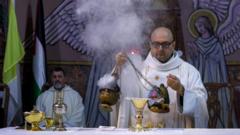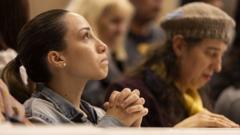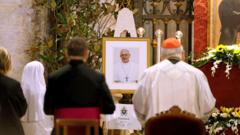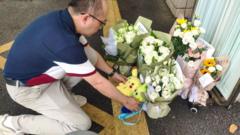The article delves into the funeral arrangements for Pope Francis, the global reactions to his death, and the implications for the future of the Catholic Church.
Pope Francis' Funeral Plans: A Modest Send-off for a Progressive Pontiff

Pope Francis' Funeral Plans: A Modest Send-off for a Progressive Pontiff
Pope Francis, who passed away at 88, will have a simplified funeral, marking a departure from tradition, as cardinals prepare for a contentious conclave to choose his successor.
In a significant turning point for the Catholic Church, the funeral of Pope Francis is set for Saturday at 10 a.m., but it will follow a more humble approach than tradition dictates. This twofold simplification mirrors Francis’ style during his papacy, characterized by an advocacy for a more accessible and compassionate church. While the Vatican has announced that cardinals are convening in Rome to pay their last respects and begin the process of selecting Francis' successor, it is likely that weeks will pass before a new pontiff is appointed.
Pope Francis, who died on Monday due to complications from a cerebral stroke, continues to evoke deep emotional responses from the global community. Memorials are taking place worldwide, including heartfelt services at the Manila Cathedral in the Philippines and the Caracas Cathedral in Venezuela, where parishioners recalled his dedication to inclusivity and social justice. From the vibrant streets of Buenos Aires to cathedrals in North America and Europe, a continent-wide outpouring of grief included tributes from political leaders honoring his legacy.
The path ahead for the Catholic Church contains complexities beyond mourning. Historical precedents dictate that the papal conclave for Francis’ successor will commence after a period of mourning, a process expected to engage the attention of cardinals from various backgrounds. Among them are leaders from both progressive and conservative factions, reflecting ongoing ideological divides within the Church. As the cardinals convene, they will face challenges in determining the direction of a church that has historically relied on central authority while navigating the demands of an evolving global society.
In addition to memorials honoring the late pontiff, the Vatican reported on Francis' simple burial wishes. He expressed a preference for an undecorated tomb in accordance with his lifelong commitment to humility. In the wake of his death, the responses from geopolitical entities like China reflecting on his attempts to bridge divides may play a significant role in international relations moving forward.
Political leaders like former President Donald Trump and Indian Prime Minister Narendra Modi plan to attend the funeral, emphasizing Francis's influence on discussions about migration and humanitarianism. As leaders reflect on the pontiff's legacy, conversations inevitably arise about whether his successor will continue to show openness to marginalized groups or revert to more conservative doctrine.
The world watches closely as the Catholic Church stands at a crossroads, contemplating a new leader who may either build on the ideals established by Francis or create a return to traditional values. With discussions already underway about who might occupy the revered papal seat, the implications of these choices will undoubtedly echo throughout the global Catholic community and beyond.
Pope Francis, who died on Monday due to complications from a cerebral stroke, continues to evoke deep emotional responses from the global community. Memorials are taking place worldwide, including heartfelt services at the Manila Cathedral in the Philippines and the Caracas Cathedral in Venezuela, where parishioners recalled his dedication to inclusivity and social justice. From the vibrant streets of Buenos Aires to cathedrals in North America and Europe, a continent-wide outpouring of grief included tributes from political leaders honoring his legacy.
The path ahead for the Catholic Church contains complexities beyond mourning. Historical precedents dictate that the papal conclave for Francis’ successor will commence after a period of mourning, a process expected to engage the attention of cardinals from various backgrounds. Among them are leaders from both progressive and conservative factions, reflecting ongoing ideological divides within the Church. As the cardinals convene, they will face challenges in determining the direction of a church that has historically relied on central authority while navigating the demands of an evolving global society.
In addition to memorials honoring the late pontiff, the Vatican reported on Francis' simple burial wishes. He expressed a preference for an undecorated tomb in accordance with his lifelong commitment to humility. In the wake of his death, the responses from geopolitical entities like China reflecting on his attempts to bridge divides may play a significant role in international relations moving forward.
Political leaders like former President Donald Trump and Indian Prime Minister Narendra Modi plan to attend the funeral, emphasizing Francis's influence on discussions about migration and humanitarianism. As leaders reflect on the pontiff's legacy, conversations inevitably arise about whether his successor will continue to show openness to marginalized groups or revert to more conservative doctrine.
The world watches closely as the Catholic Church stands at a crossroads, contemplating a new leader who may either build on the ideals established by Francis or create a return to traditional values. With discussions already underway about who might occupy the revered papal seat, the implications of these choices will undoubtedly echo throughout the global Catholic community and beyond.























